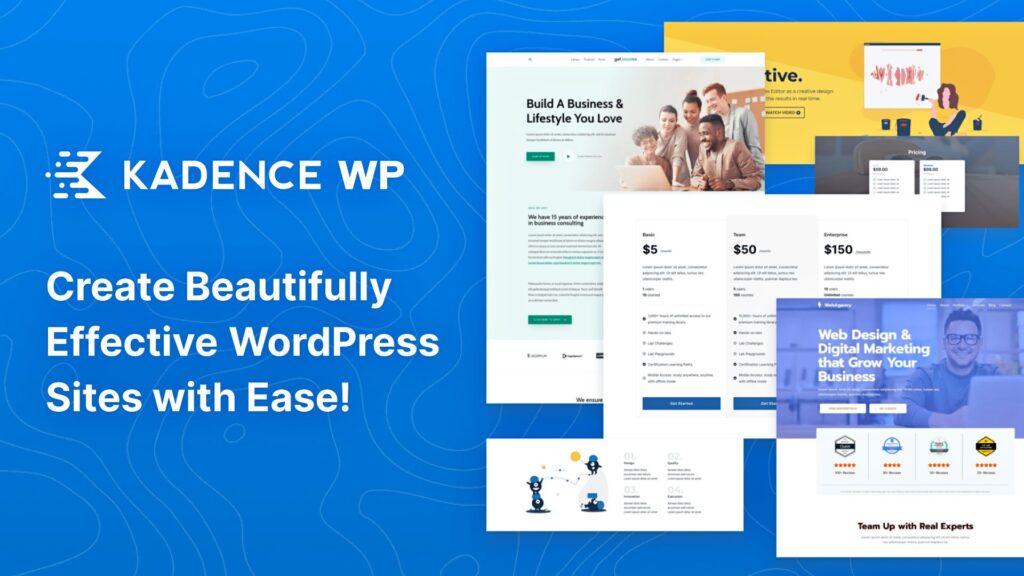What Is WordPress?
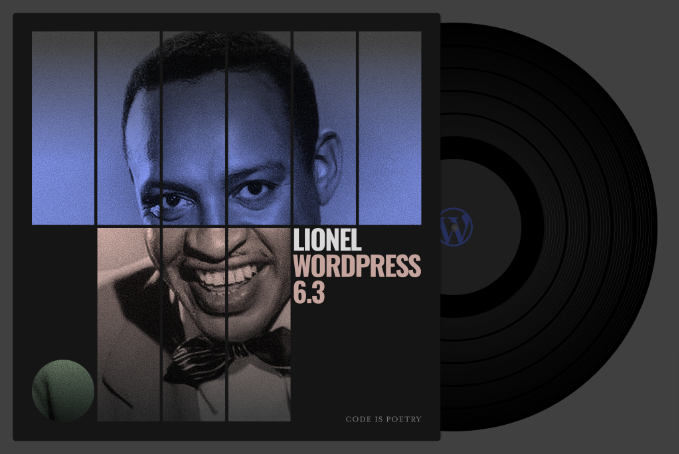
WordPress is a free, open-source website creation platform. On a more technical level, WordPress is a content management system (CMS) written in PHP that uses a MySQL database. In non-geek speak, WordPress is the easiest and most powerful blogging and website builder in existence today.
WordPress is an excellent website platform for a variety of websites. From blogging to e-commerce to business and portfolio websites, WordPress is a versatile CMS. Designed with usability and flexibility in mind, WordPress is a great solution for both large and small websites.
What is a WordPress Website?
A WordPress website is any website that uses WordPress as its content management system (CMS). WordPress powers both the backend of the website (the interface where a user logs in to make changes or add new content) and the frontend (the visible part of the website that your visitors see on the web).
Here are just a few examples of the types of websites you can build with WordPress:
- Blog – A blog is a special type of website devoted to sharing thoughts, photos, reviews, tutorials, recipes and so much more. Blogs usually display the most recently-published content first.
- eCommerce website – An eCommerce website allows you to sell goods or services online and collect payment via an online payment system. You can download and install a WordPress e-commerce plugin to extend the default functionality of WordPress so you can have an online store on your website.
- Business website – Many businesses will benefit from having an online presence in the form of their own website. If your business needs a website for customers to learn about your company and what you have to offer, WordPress is an excellent option. Customers can contact you, ask for a quote, schedule an appointment and much more.
- Membership website – A membership website allows you to put content behind a paywall or an account login. To access pages or posts, users must login or pay for the content. WordPress can also handle membership websites with additional plugins.
- Portfolio website – Show off your artwork, design skills and more with a portfolio website built on WordPress.
- Forum website – A forum website can be a helpful place for users to ask questions or share advice. Believe it or not, many forum websites run on WordPress.
- Event website – Hosting an event? WordPress makes it easy for you to share your event details and sell tickets.
- E-learning website – Students can take online courses, track their progress, download resources and much more from an e-learning website. With a special kind of plugin called a WordPress LMS plugin, you can offer online courses from a WordPress website.
- Wedding website – Share the details of your big day with a wedding website built on WordPress. With an array of WordPress wedding themes, you can get a website up quickly and easily.
The possibilities are endless when it comes to customizing a WordPress website. WordPress themes and plugins can add new design options and added functionality. Check out WordPress.org for free themes and plugins.
Is WordPress right for me?
If you’re wondering why WordPress is such a widely used website content management system, here are some of the benefits of WordPress as a website platform:
- Simplicity: WordPress allows you to publish and build your website content quickly. Even as a beginner, you can easily use WordPress.
- The cost is free – The actual WordPress software available on WordPress.org is free to download and use. You will, however, need to pay for web hosting and a domain name.
- Flexibility: WordPress allows you to create many types of websites, from personal blogs and online stores to online magazines and newspapers.
- Easy to use – If you can use a word processing software like Microsoft Word, you can use WordPress to build and manage a website.
- Open-source software – WordPress is open-source software that is licensed under the GNU General Public License (GPL), meaning it isn’t owned by a single company or entity. Hundreds of developers and users collaborate and contribute to the software to improve it. The spirit of open source means constant improvements, accountability, and free usage for everyone.
- No need to know code – WordPress removes the requirement of needing to know how to code to build a website. While WordPress utilizes a variety of coding languages, there’s no need to know any of them to use WordPress.
- Extendable with WordPress plugins – The core WordPress software can be extended with WordPress plugins. WordPress plugins are bits of software that you can upload to your website to add more features (such as e-commerce, SEO, backups, contact forms, and more). There are thousands of free WordPress plugins available on the WordPress.org plugin directory and a thriving premium (paid) plugins industry.
- Highly customizable with WordPress themes – WordPress themes provide the design and layout of your website. With a click of a button, you can change the entire look of your website by applying a new WordPress theme. More advanced WordPress themes are more like WordPress page builders, giving you even more control of your layouts.
- Website security – While no website platform is 100% secure, WordPress security continues to improve with a vigilant security team of core developers and users. Common WordPress security issues are usually due to user error rather than the software itself.
- A thriving community of users and developers – When you have a WordPress website, you can also get involved in the greater WordPress community through your local WordPress Meetup, WordCamps, and more. The WordPress community has a reputation for being incredibly welcoming, helpful, and innovative.
- A premium plugin and theme industry – While there are loads of free plugins and themes, most serious WordPress website owners invest in premium (paid) plugins or themes. Why? Your purchase of a reputable premium plugin or theme helps pay for the ongoing development and support of the plugin or theme, including new features, security patches, and more.
WordPress Features
As a website-building platform and CMS, WordPress boasts an impressive feature set. Here are just a few of the many features of WordPress.
- SEO – Search Engine Optimization (SEO) begins at a technical level, and WordPress delivers an exceptional code base for SEO. SEO allows your website’s content to be found via standard search engines such as Google or Bing.
- Speed – WordPress is a lean website framework that is constantly striving to remove code “bloat” that slows down the loading speed of a website.
- Mobile-friendly – Most WordPress themes are now mobile-friendly or responsive out-of-the-box.
- Media file library – WordPress includes a built-in media library where you can upload and embed media files such as images or videos into your pages or posts. You can even perform basic edits to your images within WordPress.
- Easy-to-use user interface – WordPress is very easy to use with no complicated settings. If you can use a WordPress processor, you can use WordPress. WordPress also has a focus on accessibility.
- Custom menus – WordPress makes it easy to create navigation menus with links to your pages or custom links.
- Built-in blog – Adding a blog to your website is as simple as publishing a post.
- New in WordPress 6.3.1: WordPress 6.3.1 is a minor maintenance release that features 4 bug fixes in Core and 6 bug fixes for the block editor. The next major release will be 6.4 planned for November 2023.
About WordPress
WordPress began in 2003 when Mike Little and Matt Mullenweg forked a little-known blogging tool known as B2/cafelog. Little and Mullenweg sought to create a better blogging platform, built on the original B2 code base, but with more robust features and more consistent development.
The result is WordPress. First a tool for blogging, WordPress quickly grew to be an extensive content management system (CMS) able to handle a variety of websites.
WordPress Usage Statistics Across the Web
According to usage statistics of content management systems new report, WordPress powers over 60 million websites or 43% of all websites on the internet and over 64% of all websites whose content management systems are known.
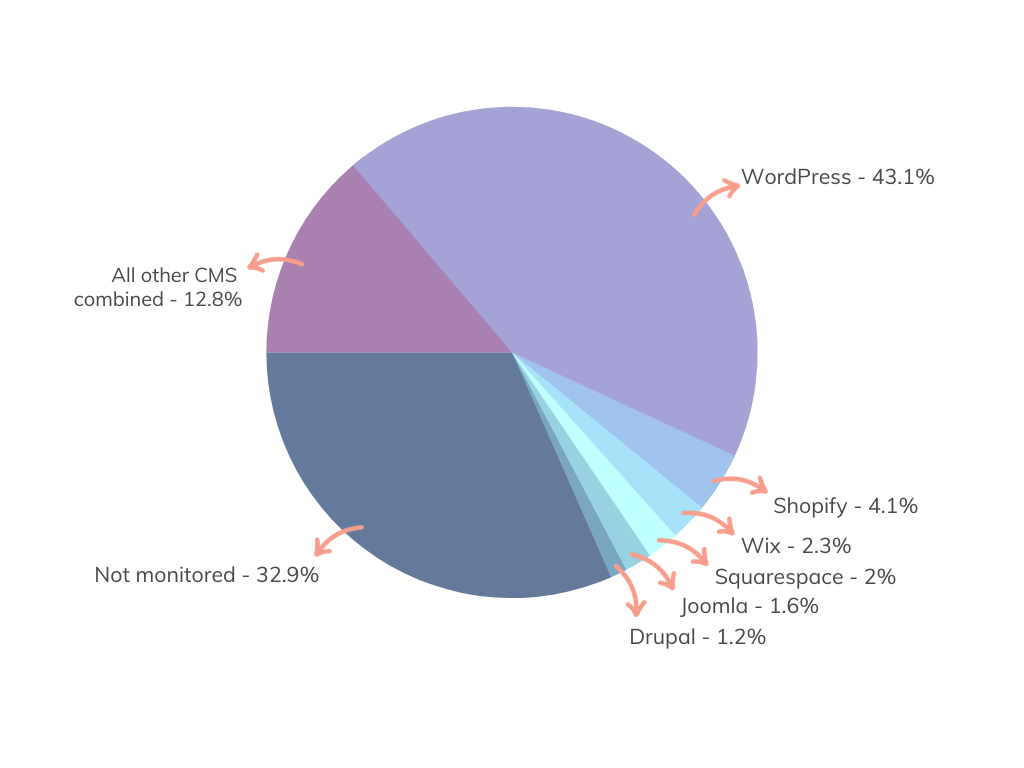
Source: Usage statistics of Content Management Systems, W3Techs, 2022
Because WordPress is free and so easy to use, it has been widely adopted as the gold standard for website builders.
Who uses WordPress?
Rest easy, knowing you’re in good company if you use WordPress to publish on the web. Many famous blogs, news outlets, music sites, Fortune 500 companies, and celebrities use WordPress, including NBC, CBS, USA Today, Time, Disney, Airbnb, Spotify, TechCrunch, and even Pioneer Woman.
If you’re ever curious about who uses WordPress, head on over to the WordPress site showcase, and you’ll be impressed by the number of well-known sites and famous people using WordPress to power their websites.
WordPress.com vs. WordPress.org
If you’re just getting started with WordPress, there are a few important things to know. First up, you’ll need to know the difference between WordPress.com vs. WordPress.org.
The difference between WordPress.com vs. WordPress.org can be a little confusing if you are new to using WordPress.
- WordPress.com is the hosted version of WordPress, where you can create a WordPress.com account to make a blog or website.
- By default, your website’s URL or domain will include the word “WordPress,” like myblog.wordpress.com.
- Paid upgrades include a custom domain, Google Analytics integration, more storage space, the ability to add your own plugins and themes, and more.
- WordPress.com is owned by Automattic, a company founded by one of the original WordPress creators, Matt Mullenweg.
- WordPress.org is where you can download the WordPress software to install on your own server or web hosting account.
- The WordPress software is open-source, so it is free to download and use.
- To use the WordPress.org version of WordPress, you’ll need to have a domain name and web hosting purchased from another reputable company like Liquidweb.
- Most web hosts offer a WordPress “quick install” or done-for-you installation of WordPress to help you get started if you don’t want to install WordPress yourself.
- WordPress.org is the non-profit foundation of Automattic.
How do I start using WordPress?
Now you’re probably asking, “How do I start WordPress?”
Again, WordPress is free. Yep, that’s right – it’s 100% free. You can get started today with a WordPress website in just a few steps.
You’ll need a few things to get started with WordPress:
- Quality web hosting
- A domain name
- The WordPress software installed on your website (most web hosts will handle this for you.)
If you’d rather use the hosted version of WordPress available on WordPress.com, you’ll simply need to create a WordPress.com account to get started.
What is a WordPress Plugin?
A WordPress plugin is a package of additional code that you can upload to your website to add new features, functionality, or integrations.
- Plugins can be added via the Plugins menu in your WordPress dashboard.
- Using the built-in search function, you can find a free plugin available on the WordPress.org Plugin directory.
- Plugins can also be packaged as zip files that you upload through the Plugins menu uploader in your WordPress dashboard.
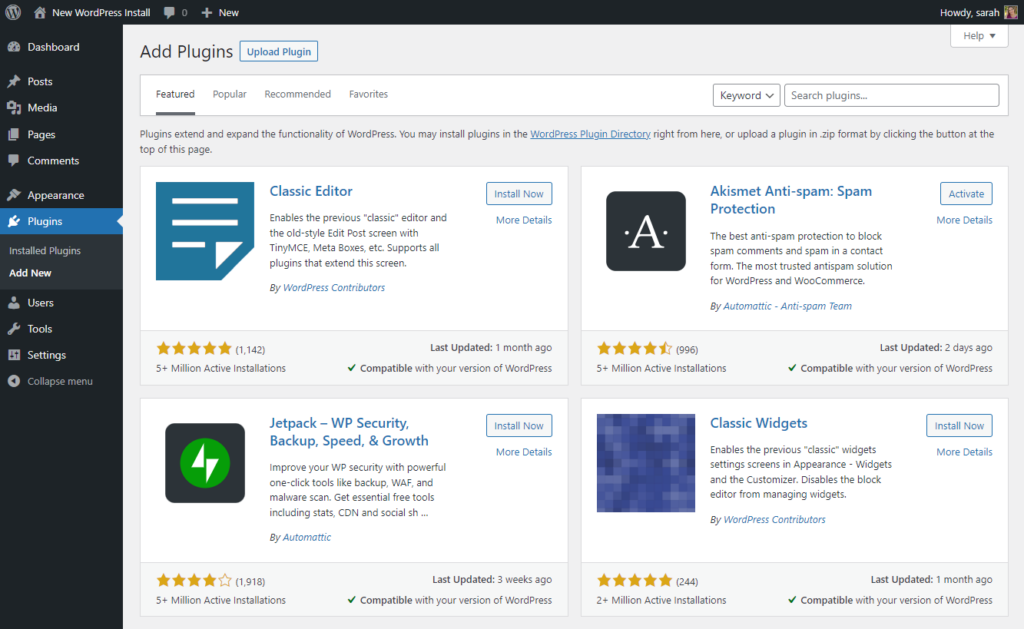
WordPress Plugin Tutorials
Here are two video tutorials on WordPress plugins:
- What are WordPress Plugins? – WordPress plugins are bits of software that can be uploaded to extend and expand the functionality of your WordPress site. In this tutorial, we cover the basics of WordPress plugins.
- Installing WordPress Plugins – Installing WordPress plugins on your site is a simple process. Learn how in this video.
Must-Have WordPress Plugins for All WordPress Sites
All WordPress websites will benefit from these must-have WordPress plugins.
- WordPress backup plugin – WordPress doesn’t have a built-in backup function, so having a WordPress backup solution in place will save you a ton of headaches should you lose any data on your website. Having a backup plan is also crucial to mitigate a security breach or hack. Solid Backups is the original WordPress backup plugin to back up, restore, or even move your website to a new host or domain.
- WordPress security plugin – A WordPress security plugin such as Solid Security works to fix common security holes and harden your website against attacks.
- WordPress SEO plugin – A WordPress SEO plugin like Yoast SEO or Rank Math can help you add additional SEO (Search Engine Optimization) features and functionality.
- WordPress form plugin – Add robust forms to your website, such as contact forms, surveys, upload files, and more, with a form builder plugin like Fluent Forms.
- WordPress e-commerce plugin – If you want to sell goods or services on your website through an online store, a WordPress e-commerce plugin such as WooCommerce is a must-have.
- WordPress donations plugin – Accept gifts for charity, or other purposes, through customizable donation forms with GiveWP, view donor data and fundraising reports, manage donors, and integrate with a wide variety of third-party gateways and services.
What is a WordPress Theme?
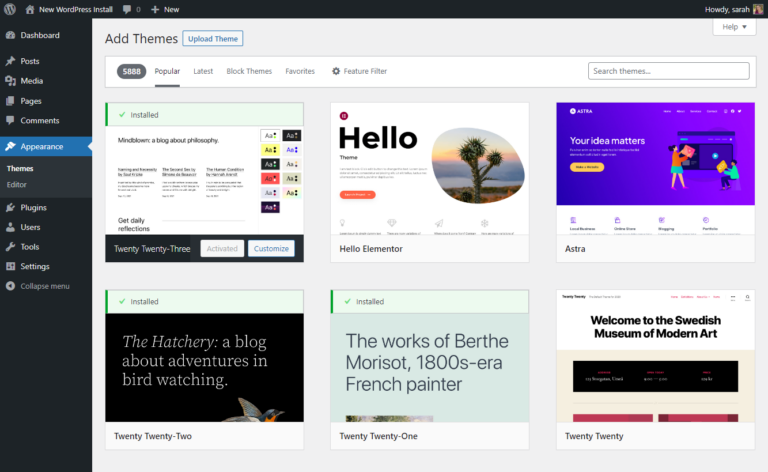
A WordPress theme provides the design “framework” of your website. Most WordPress themes provide:
- The overall design (the look, feel, and style) of your site
- Site-wide font styles
- Color scheme
- Styles for blog posts and blog archives
- Page layouts (or templates)
- Widget locations
- Additional stylistic details
Some themes operate like WordPress page builders, allowing you to create your own page layouts without code.
- Themes can be added via the Appearance > Themes menu in your WordPress dashboard.
- Using the built-in search function, you can find a free theme available on WordPress.org.
- Themes can also be packaged as zip files that you upload through the Appearance > Themes menu uploader in your WordPress dashboard.
Sign-up for security insights
Your email address is safe with us! Unsubscribe at any time.
Kadence Theme
Kadence Theme from Kadence WP is a lightweight yet full-featured WordPress theme for creating beautiful, fast-loading, and accessible websites easier than ever. It features an easy-to-use drag-and-drop header and footer builder to build any type of header in minutes. It features a full library of gorgeous starter templates that are easy to modify with our intelligent global font and color controls. With extensive integration with the most popular 3rd party plugins, you can quickly build impressive ecommerce websites, course websites, business websites, and more.
WordPress Theme Tutorials
Here are two WordPress theme tutorials:
- What is a WordPress Theme? – A WordPress theme provides all of the front-end stylings of your WordPress site. Most WordPress themes provide your site’s overall design or style, font styling, colors, widget locations, page layouts (or templates), styles for blog posts and blog archives, and additional stylistic details.
- How to Install a WordPress Theme – In addition to the default theme included with your WordPress installation, you can also install your own WordPress theme to change the look and style of your site.
Free WordPress Tutorials
If you are a WordPress beginner, there are helpful WordPress tutorials to help you get started and learn WordPress. From how to access your WordPress login screen to how to add a WordPress post or page, these video tutorials cover all the basics.
- Your WordPress Login – Once WordPress has been installed on your web server, you can access your WordPress login page from two different URLs.
- Exploring the WordPress Dashboard – The WordPress Dashboard allows you to control all of the behind-the-scene details of managing your site. Once you find your way around the dashboard, you’ll realize it’s really easy to use and navigate.
- Using the WordPress Admin Bar – the WordPress Admin Bar or toolbar. The WordPress Admin Bar is a shortcut area that allows you to access the behind-the-scenes controls when you’re on the front end of your WordPress blog or website.
- Exploring WordPress Settings – WordPress offers many settings for customizing your website’s functions. In this tutorial, we cover WordPress Settings in depth.
- WordPress Posts vs Pages – When it comes to creating content for your WordPress site, you have the option to choose between creating either a post or a page. Both have respective uses and can add dynamic elements to your site.
- Creating a WordPress Post – This tutorial covers adding your first WordPress post.
- Adding Links in WordPress – The WordPress post and page editor makes it easy to add hyperlinks to other web pages from your content. This tutorial covers how to add links to your content.
- Adding Images in WordPress – Using a visual element like an image or photo is a great way to spruce up your post or page content. Learn how easy it is to add images in WordPress.
- Using the WordPress Media Library – In this tutorial, we walk through using the WordPress Media Library. The WordPress Media Library contains all the files you’ve uploaded to your WordPress site, with the most recent uploads listed first.
- Formatting WordPress Posts – In this tutorial, we cover some of the basics of formatting your WordPress posts with the built-in WordPress post editor.
- Scheduling WordPress Posts – Scheduling WordPress posts is an easy way to control when your content is published. In this video, we show you how to use the built-in WordPress post scheduler to add a time to publish.
- WordPress Categories & Tags – WordPress categories and tags can add an organizational structure to your WordPress posts. This tutorial covers how to use categories and tags.
- Creating a WordPress Page – Creating a WordPress page is very similar to creating a post. Just remember that pages are intended for static content, while posts are time-based.
- Applying a WordPress Page Template – Some WordPress themes include page templates that change how your pages are formatted on the front end (the visible part of your website). By using page templates, your WordPress theme can give you some flexibility for how your pages look and where certain page elements are located.
- Creating a Custom Menu in WordPress – Not sure how to best use menus in your WordPress site? In this short video, we share some tips and tricks to get your site navigation up and running in no time.
- Managing Comments in WordPress – Comments add a more interactive discussion element to your website, allowing visitors to comment on posts or pages. This video shows you how to manage comments on your website.
- Creating Users in WordPress – Creating users in WordPress allows you to add users with different roles and access privileges to your site. Once created, a user will be able to log in to your site with a username and password.
Making Money with WordPress
New industries have sprouted from WordPress. Today, the possibilities of making money with WordPress range from running an online store to building websites for clients to WordPress consulting.
- Build WordPress websites for clients – If you are a web developer or designer, you can specialize in WordPress websites. Since WordPress is so easy to use, training clients to use their websites is a bonus of specializing in WordPress.
- WordPress maintenance – Often, WordPress site owners don’t have time to maintain their websites. WordPress maintenance includes important website tasks such as software updates, backups, security, SEO and more.
- WordPress SEO – WordPress SEO services can be useful to many businesses hoping to generate more organic search traffic and outrank their competitors. You can specialize in WordPress SEO by providing web site audits, keyword research, content writing and more.
- WordPress consulting – Some businesses need guidance on how to design, build, grow or improve their website. WordPress consultants know all the ins and outs of WordPress optimization, functionality, tools and features.
- Content writing – Knowing how to use WordPress makes you an appealing candidate to many businesses that need content marketing services.
Learn WordPress
Check out the entire series of free WordPress tutorials, free WordPress Guides, and free Solid Academy Live.
